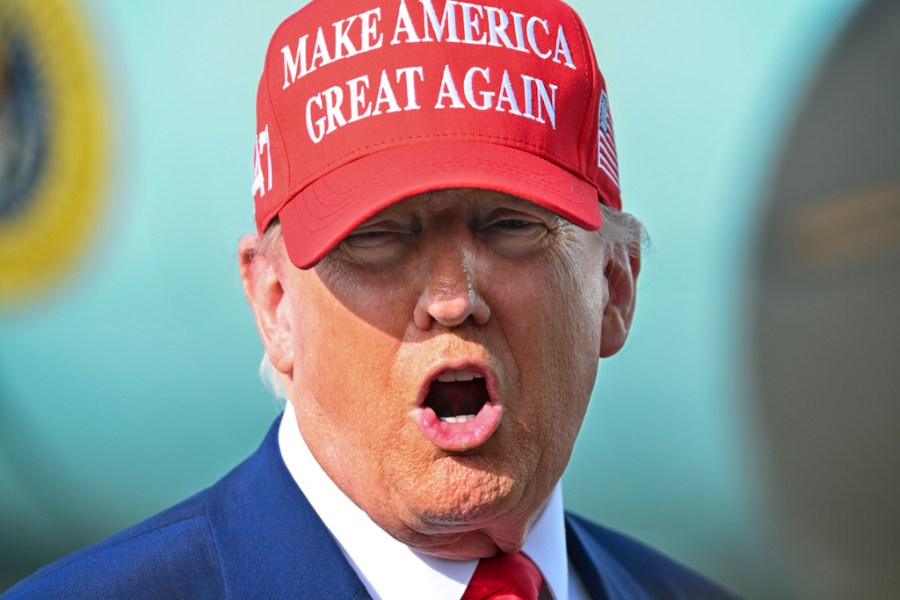
President Trump has embarked on an unprecedented experiment in executive overreach that threatens the balance of powers and longstanding institutional commitments that have defined American government.
To begin his second term, Trump has already abandoned commitments to federal employees, abruptly withdrawn international aid, and imposed drastic funding freezes. This all points to a deliberate effort to consolidate executive power.
These actions are not mere policy adjustments but constitute a fundamental assault on the constitutional principles that have long guided the nation, while potentially undermining democratic stability.
A central indicator of this troubling shift is the administration’s decision to freeze funding for nearly 2,600 federal programs. Trump and his Cabinet secretaries are using DOGE — formerly the U.S. Digital Service, a creation of the Obama administration that was given unprecedented government-wide access — to impose unilateral cuts of programs it doesn’t like, even where funds have already been approved by legislative action. By withholding funds that Congress has appropriated, the executive branch sidesteps its constitutional limits and undermines legislative authority.
This maneuver violates established fiscal controls and sets a dangerous precedent, potentially allowing future administrations to bypass democratic oversight.
Another major policy shift is Trump’s comprehensive federal hiring freeze and deferred resignation offer for most federal employees. Marketed as a measure to cut government spending and eliminate inefficiencies, this policy is widely seen as a tactic to weaken the nonpartisan civil service. By inducing long-serving and experienced employees to leave, the administration risks depleting the institutional memory and expertise necessary for effective governance.
The undermining of merit-based hiring practices will lead to lasting damage in key areas such as health care, environmental protection, education and public safety, ultimately reducing the quality of government services that citizens rely upon daily, with severe consequences.
Internationally, the administration has sharply retreated from global cooperation. Embracing an “America First” approach, it issued orders to withdraw from the World Health Organization, suspend foreign development assistance for at least 90 days and shut down USAID. These moves signal a willingness to abandon longstanding international commitments in favor of narrow national interests.
Such actions will undermine global health security and diminish U.S. influence on the world stage. The decision to forsake multilateral engagement raises serious concerns about America’s future role as a leader in addressing transnational challenges, thereby imperiling international long-term global stability and sustained cooperation.
The actions of DOGE, particularly its access to sensitive Treasury Department data, highlight significant risks to trust in the U.S. financial system. Experts, including former Treasury secretaries, warn that the mishandling of Treasury systems could erode confidence in U.S. financial management and harm the dollar’s standing as the world’s reserve currency.
Furthermore, privacy advocates view DOGE’s actions as a dangerous centralization of power that threatens to compromise Americans’ personal data security. These developments, coupled with rhetoric dismissing traditional safeguards as inefficiencies, contribute to a broader erosion of trust in government institutions.
The cumulative effect of these executive actions has been a steady erosion of public trust in government.
Americans have long depended on a system of checks and balances that prevents any single branch from accumulating too much power. Yet as the executive branch repeatedly bypasses legislative oversight — through funding freezes, hiring bans, and international disengagement — the foundation of trust is crumbling.
Each unilateral executive move reinforces a growing perception that decisions are made for ideological rather than public benefit. This erosion of trust fuels disillusionment and deepens political polarization, undermining the legitimacy of all governmental institutions, thus endangering our nation’s democratic future.
A fierce legal backlash is arising. States, advocacy groups and federal employees have challenged the executive branch’s authority to make various changes, such as impounding funds and imposing hiring freezes without congressional approval. Federal judges have issued injunctions against some of these measures, reasserting the judiciary’s role as a check on executive power.
These legal battles are in their early stages, but this legal resistance is a crucial element in the fight to restore balance and preserve democratic governance in America.
Unfortunately, in another example of the reckless erosion of trust, rhetoric from administration officials and allies, including Vice President JD Vance and Elon Musk, undermines the principle of judicial independence. Vance asserted that “judges aren’t allowed to control the executive’s legitimate power,” suggesting that judicial oversight of executive actions is inappropriate.
Musk went further, labeling a federal judge as “a corrupt judge protecting corruption” and calling for his immediate impeachment. Such rhetoric tests the limits of the Constitution’s checks and balances. By undermining the judiciary’s role as a co-equal branch of government, these remarks risk diminishing public confidence in the impartiality and authority of the courts.
Meanwhile, the international consequences of this internal upheaval are significant. The U.S. risks losing its leadership role on critical issues such as climate change and global health. As the country retreats from multilateral agreements and international organizations, China and other rival powers will seize the opportunity to challenge its influence.
This shift also diminishes America’s soft power in addressing transnational challenges. This weakening of collective efforts to tackle shared problems endangers future global unity.
Trump’s combination of funding freezes, hiring bans, environmental rollbacks, and international withdrawals not only threatens critical public services and international cooperation, but also the essential trust between government and citizens.
The long-term consequences of this executive overreach may redefine American democracy. This makes it imperative for all who value freedom and accountability to stand united in defense of constitutional principles to ensure our republic’s survival.
Gleb Tsipursky, Ph.D., serves as the CEO of the hybrid work consultancy Disaster Avoidance Experts and authored the best-seller “Returning to the Office and Leading Hybrid and Remote Teams.“












